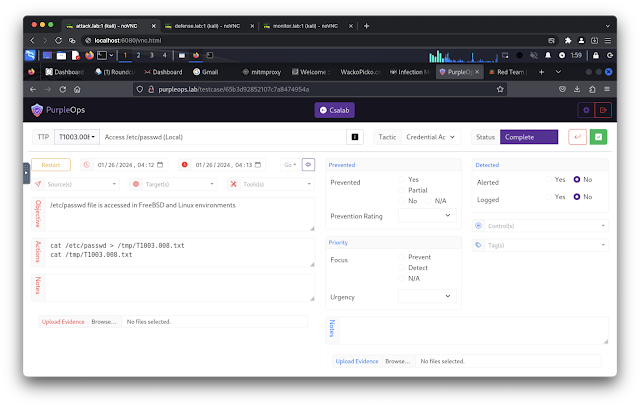CSAF - Cyber Security Awareness Framework
The Cyber Security Awareness Framework (CSAF) is a structured approach aimed at enhancing Cybersecurity" title="Cybersecurity">cybersecurity awareness and understanding among individuals, organizations, and communities. It provides guidance for the development of effective Cybersecurity" title="Cybersecurity">cybersecurity awareness programs, covering key areas such as assessing awareness needs, creating educational m aterials, conducting training and simulations, implementing communication campaigns, and measuring awareness levels. By adopting this framework, organizations can foster a robust security culture, enhance their ability to detect and respond to cyber threats, and mitigate the risks associated with attacks and security breaches.
Requirements
Software
- Docker
- Docker-compose
Hardware
Minimum
- 4 Core CPU
- 10GB RAM
- 60GB Disk free
Recommendation
- 8 Core CPU or above
- 16GB RAM or above
- 100GB Disk free or above
Installation
Clone the repository
git clone https://github.com/csalab-id/csaf.gitNavigate to the project directory
cd csafPull the Docker images
docker-compose --profile=all pullGenerate wazuh ssl certificate
docker-compose -f generate-indexer-certs.yml run --rm generatorFor security reason you should set env like this first
export ATTACK_PASS=ChangeMePleaseexport DEFENSE_PASS=ChangeMePleaseexport MONITOR_PASS=ChangeMePleaseexport SPLUNK_PASS=ChangeMePleaseexport GOPHISH_PASS=ChangeMePleaseexport MAIL_PASS=ChangeMePleaseexport PURPLEOPS_PASS=ChangeMePleaseStart all the containers
docker-compose --profile=all up -dYou can run specific profiles for running specific labs with the following profiles - all - attackdefenselab - phisinglab - breachlab - soclab
For example
docker-compose --profile=attackdefenselab up -dProof
Exposed Ports
An exposed port can be accessed using a proxy socks5 client, SSH client, or HTTP client. Choose one for the best experience.
- Port 6080 (Access to attack network)
- Port 7080 (Access to defense network)
- Port 8080 (Access to monitor network)
Example usage
Access internal network with proxy socks5
- curl --proxy socks5://ipaddress:6080 http://10.0.0.100/vnc.html
- curl --proxy socks5://ipaddress:7080 http://10.0.1.101/vnc.html
- curl --proxy socks5://ipaddress:8080 http://10.0.3.102/vnc.html
Remote ssh with ssh client
- ssh kali@ipaddress -p 6080 (default password: attackpassword)
- ssh kali@ipaddress -p 7080 (default password: defensepassword)
- ssh kali@ipaddress -p 8080 (default password: monitorpassword)
Access kali linux desktop with curl / browser
- curl http://ipaddress:6080/vnc.html
- curl http://ipaddress:7080/vnc.html
- curl http://ipaddress:8080/vnc.html
Domain Access
- http://attack.lab/vnc.html (default password: attackpassword)
- http://defense.lab/vnc.html (default password: defensepassword)
- http://monitor.lab/vnc.html (default password: monitorpassword)
- https://gophish.lab:3333/ (default username: admin, default password: gophishpassword)
- https://server.lab/ (default username: [email protected], default passowrd: mailpassword)
- https://server.lab/iredadmin/ (default username: [email protected], default passowrd: mailpassword)
- https://mail.server.lab/ (default username: [email protected], default passowrd: mailpassword)
- https://mail.server.lab/iredadmin/ (default username: [email protected], default passowrd: mailpassword)
- http://phising.lab/
- http://10.0.0.200:8081/
- http://gitea.lab/ (default username: csalab, default password: giteapassword)
- http://dvwa.lab/ (default username: admin, default passowrd: password)
- http://dvwa-monitor.lab/ (default username: admin, default passowrd: password)
- http://dvwa-modsecurity.lab/ (default username: admin, default passowrd: password)
- http://wackopicko.lab/
- http://juiceshop.lab/
- https://wazuh-indexer.lab:9200/ (default username: admin, default passowrd: SecretPassword)
- https://wazuh-manager.lab/
- https://wazuh-dashboard.lab:5601/ (default username: admin, default passowrd: SecretPassword)
- http://splunk.lab/ (default username: admin, default password: splunkpassword)
- https://infectionmonkey.lab:5000/
- http://purpleops.lab/ (default username: [email protected], default password: purpleopspassword)
- http://caldera.lab/ (default username: red/blue, default password: calderapassword)
Network / IP Address
Attack
- 10.0.0.100 attack.lab
- 10.0.0.200 phising.lab
- 10.0.0.201 server.lab
- 10.0.0.201 mail.server.lab
- 10.0.0.202 gophish.lab
- 10.0.0.110 infectionmonkey.lab
- 10.0.0.111 mongodb.lab
- 10.0.0.112 purpleops.lab
- 10.0.0.113 caldera.lab
Defense
- 10.0.1.101 defense.lab
- 10.0.1.10 dvwa.lab
- 10.0.1.13 wackopicko.lab
- 10.0.1.14 juiceshop.lab
- 10.0.1.20 gitea.lab
- 10.0.1.110 infectionmonkey.lab
- 10.0.1.112 purpleops.lab
- 10.0.1.113 caldera.lab
Monitor
- 10.0.3.201 server.lab
- 10.0.3.201 mail.server.lab
- 10.0.3.9 mariadb.lab
- 10.0.3.10 dvwa.lab
- 10.0.3.11 dvwa-monitor.lab
- 10.0.3.12 dvwa-modsecurity.lab
- 10.0.3.102 monitor.lab
- 10.0.3.30 wazuh-manager.lab
- 10.0.3.31 wazuh-indexer.lab
- 10.0.3.32 wazuh-dashboard.lab
- 10.0.3.40 splunk.lab
Public
- 10.0.2.101 defense.lab
- 10.0.2.13 wackopicko.lab
Internet
- 10.0.4.102 monitor.lab
- 10.0.4.30 wazuh-manager.lab
- 10.0.4.32 wazuh-dashboard.lab
- 10.0.4.40 splunk.lab
Internal
- 10.0.5.100 attack.lab
- 10.0.5.12 dvwa-modsecurity.lab
- 10.0.5.13 wackopicko.lab
License
This Docker Compose application is released under the MIT License. See the LICENSE file for details.
Via: www.kitploit.com
 Reviewed by Zion3R
on
14:10
Rating:
Reviewed by Zion3R
on
14:10
Rating:














